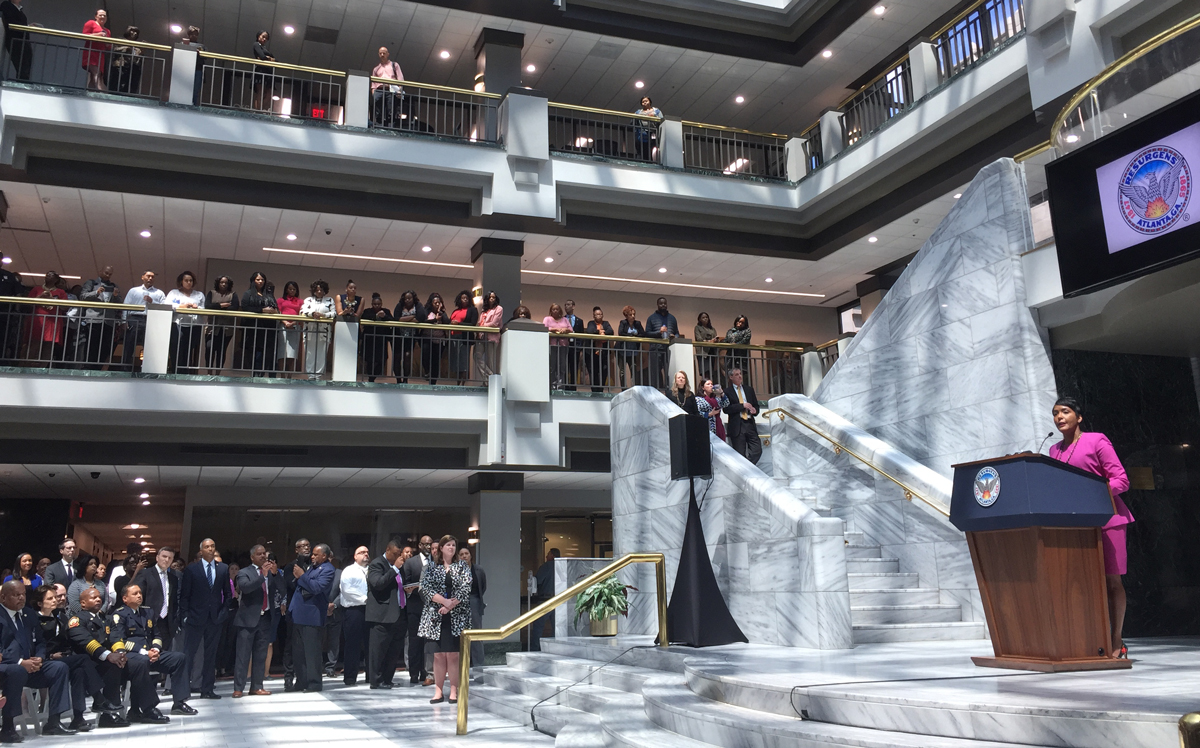
Photograph by Thomas Wheatley
On the morning of Monday, April 9, much like how her predecessors kicked off every week, Mayor Keisha Lance Bottoms met with department heads and top staffers—nearly all of whom were holdovers from Kasim Reed’s administration—at City Hall for a check-up on how the capital of the Southeast was performing. She then asked more than 25 of those officials to submit their resignation letters by the end of the day. And according to media reports, Bottoms told the surprised officials that she would decide who to keep and who to let go by Friday.
The news of Bottoms’ decree—and the manner in which it was delivered—sent shock waves through Atlanta and beyond. The Atlanta Journal-Constitution called it a “shake-up.” “Survivor: Atlanta City Government has just begun,” decreed black news and culture blog the Root, calling Bottoms “the coldest.” On the Atlanta page of message board Reddit, users debated whether it was a shrewd maneuver or a heavy-handed bout of theater, a morale killer that might have been better handled with a simple visit from human resources. It’s common for new U.S. presidents and corporate CEOs to switch out leadership teams. But those changes are often the result of different political parties taking power, or in the case of the private sector, come with a severance package.
Speaking the next day to reporters and more than 100 city employees gathered along the railings of City Hall’s five-story atrium, Bottoms said the chatter relayed from the meeting was not entirely accurate. Bottoms did not plan to definitively decide who stays and goes by the end of the week, she said, but rather plans to “get it right [rather] than rush it.” Bottoms declined to name who’s already left, saying to single one person or department out would be “inappropriate,” but the AJC confirmed that Anne Torres, who served as Reed’s communications director for five and a half years, had left after fulfilling a commitment to help launch the new administration. Some officials might stay in their current role or take another position at City Hall, Bottoms said, and others might leave for jobs they’ve already had lined up or because the mayor wants a change. And she was a bit surprised by the negative media reaction: Bottoms told staffers after taking office that she wanted to keep them on for 90 days while she built her administration.
Regardless of tactics, the message she intended to send was clear: Bottoms, who on the campaign trail (and even in years before announcing her candidacy) was branded as a puppet of Reed, a characterization she considered unfair and sexist, wants to put her own stamp on her time in office.
“I think it’s important for me to establish my team,” Bottoms said when asked whether the approach was appropriate. “It’s important for the public to know that the team going forward is a team I selected, not inherited.”
Last week marked the end of Bottoms’s first 100 days, a symbolic milestone when a first-term incumbent is expected to set the tone for their time in office—and present a clear vision of his or her plans while in power. But since taking office on January 2, Bottoms has been relatively quiet as she outlines the structure of that vision. She kicked off blight-eradication initiatives and programs connecting youths with start-ups and incarcerated fathers with jobs, hinting a focus on social justice. The city’s purchase of the 4.5-mile rail segment that will become the Atlanta Beltine’s Southside Trail was a major achievement. But the latter was a deal long in the works at City Hall. And right now, Bottoms is where no elected official wants to be: a posterchild for the importance of creating a secure password after cyberhackers paralyzed the city’s IT system on March 22, forcing police officers to write reports using pens and paper and hamstringing the collection of water bills.
At the same time, many of the recent high-profile stories about City Hall have focused on controversies from the Reed administration, such as his staffer’s alleged violations of the Open Records Act, Reed’s business-class tickets to South Africa for an economic development trip, or the ongoing probe of City Hall corruption that has resulted in three guilty pleas and saw the indictment of Mitzi Bickers, a longtime political operative accused of accepting bribes to help vendors land contracts. (Bickers is pleading not guilty.)
In response to those stories, Bottoms is attempting to repair City Hall’s reputation. During the April 10 press conference, Bottoms thanked employees for their ethics and patience during the scandal, an ugly episode in the city’s history from which Atlanta would emerge stronger, she said. Its second purpose was the announcement—also almost overshadowed by the hubbub surrounding the mass resignations—that the city this summer would unveil “Atlanta’s Open Checkbook,” an online website that gives journalists and City Hall gadflies information they’ve craved for years: complete data on the city’s finances, including employee salaries, department expenditures, and contracts. The tool—unfortunately named in light of the City Hall corruption scandal—mirrors similar systems used in Dallas, Austin, and Boston that use “transparency to combat the perception of government waste and abuse,” said Richard Cox, the city’s chief operating officer.
It’s not a novel idea. Last year, then-Atlanta City Councilwoman Mary Norwood and her colleague Felicia Moore (now the city council president) proposed the idea of putting “checkbook-level” spending online—a move opposed by Reed. In May 2017, the Atlanta City Council—including Bottoms—approved asking vendors to submit qualifications to create a website called “Transparent Atlanta” that would display city finances. But the initiative foundered, according to Moore, after the administration did not support the measure.
Bottoms calls all of this a “reboot for the city.” How much of a reboot it will really be depends on who in her cabinet will stay or go, and how the episode plays out amongst the team that remains. In addition, the city has yet to hear a clear strategy outlining specific projects she wants to launch and see through to completion. But to Moore, the glimpse inside City Hall’s pocketbook is something Atlanta needs. “This is a good kick,” she says. “A good start.”













